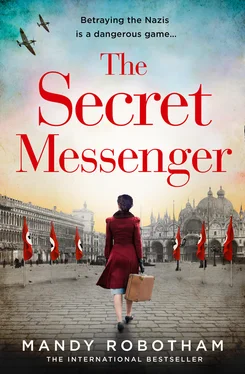There’s a welcome gap in the clouds in mid-February. At Nazi command, I take the cover off my works typewriter early one morning and see a tiny folded square of paper under one footing. I scout around the office – only Marta is humming to herself as she lays out some of the day’s work. I’d never had her down as a Staffetta, but equally I’m not supposed to be one either, so her innocent enough looks could be her best ally. Looking around me, I slide out the note and pocket it quickly. Cristian strides into the office, looking strangely upbeat and sporting something like a smile.
‘Good morning, all,’ he says, in Italian this time, since it’s only Marta and myself, and then, ‘Good morning Signorina. Are you well?’
I stammer something positive and quickly make my excuses to go to the toilet. The note has all the hallmarks of Resistance, using language and a code known only to my local battalion. It says to meet a contact in the corner of Campo San Polo and await further instructions. I deposit the piece of paper in my heel and head back to the office, barely suppressing my happiness. The tone of the note doesn’t sound like a routine message drop; perhaps there’s something I’m needed for, a task that will make me feel of even more value to the cause.
Cristian looks up as I return to the office, with a smile to accompany.
‘Ah Signorina Jilani, you’re back—’
‘Sorry. I’m needing to visit the—’
‘Yes, yes, no mind at all,’ he says, moving towards my desk, a large book in his hand. ‘I simply wanted to give you this.’ And he lays the volume down. It’s a thick, dictionary-like tome of technical translations. ‘I thought it might make life easier,’ he says. ‘For all those tricky words you – we – ponder over.’ Despite tiny flecks of grey in his beard, he looks like a boy who’s just given his teacher the shiniest, plumpest apple. There’s a proud half-smile under the bristles of his neatly clipped beard.
For a few seconds, I’m stumped for a reaction – part of me thinks I’ve already been found out, and it’s his warped sense of humour presenting me with a fait accompli. Any minute now a line of fascist police will come thundering through the door to escort me to a dungeon somewhere and an unthinkable future. But the expression on Cristian’s face says he’s genuinely pleased at the giving. And there is no rumble of footsteps up the marble staircase. I really wish in that moment that he didn’t sport a death’s head badge, so I could like him more.
‘Well, thank you,’ I manage. ‘It will undoubtedly be very useful.’ Part of me wants to laugh at the ridiculous nature of it – the fact that a fascist overseer is helping a member of the Resistance better translate valuable documents. And yet, I don’t want to laugh at him. I hate to admit it, but it’s a very human act of consideration.
‘Thank you, Signor De Luca,’ I say again. ‘I do appreciate it.’
He looks about the office, making sure that Marta is out of earshot. ‘Cristian, please.’ He turns and sits back at his desk.
The clock hands crank slowly towards 5.30, and I am packing up as the hand strikes half past, a jangle of emotions inside but careful to appear outwardly relaxed, as if it’s just another end of a normal day. Cristian is still hard at work on his document and looks up only briefly to say goodbye. I have to walk fast to weave my way through the network of streets towards Campo San Polo, taking time to double back, stopping to window-shop as a way of ensuring that no one is following. No matter the hurry, it’s been drummed into us that checking is vital. It saves lives – ours and many others possibly. I feel sure the way is clear as I enter the vast campo , and head towards the church entrance – it’s a good place to loiter at this time of day, as I could easily be one of the worshippers making their way in for evening service, the resounding clanging of the bells calling them to prayer. Ever since I was a small girl, the deep chime of church bells across the city has felt like a security blanket; present each and every day, enduring through war and famine. I feel sure that if they carry on, so can we.
Several older women pass by, bundled in their winter coats, rosaries in hand, looking at me quizzically. They are followed by a few men, some with the hint of a leer. I ignore each, stamping my feet against the cold, and they move on. Ten minutes go by and I’m wondering if my contact will arrive at all – the meet will be cancelled if any fascist patrols are nearby. Any longer and I will start to look suspicious, meaning I’ll have to simply walk away, affecting the irritated look of a woman being stood up by her date, swallowing the pitying looks of those around me. That’s the role of a Staffetta.
In the next minute he comes from behind me, swings around in front and makes to kiss me on both cheeks. In the split second before, I see the subtlest of nods and a raise of eyebrows that signal: it’s fine, play along.
‘Gisella! So sorry to be late. Can you forgive me?’ he cries, at just the right pitch to be heard, but short of a bad actor overprojecting on stage. As he moves to kiss my cheek, he whispers: ‘Lino.’ Gisella and Lino, young lovers. He’s used my Resistance code name so I’m happy to slip into the lie.
‘I forgive you, Lino – just this once,’ and I tease out a smile.
‘Shall we go?’ He proffers a hand and I take it, skipping alongside him like a woman excited to be with her lover.
He leads me through several streets towards the Croce district and we work hard at playing the convincing couple as we pass by others in the street. ‘How was your day?’ he questions. ‘What did you have for lunch?’
Eventually, we reach a darkened alleyway, pass under a low, stone sotto archway, opening out into a courtyard of houses. It’s empty aside from a traditional stone well to one side, and ‘Lino’ leads me to a darkened door. He raps three times on the door, pauses and knocks three more times. The door opens and we climb a set of granite stairs, not dirty but dank, as though someone has brought in canal water to wash them. My heart is pumping, although my breathing is under control for now. In these situations, I always question: Does this feel right? In a strange place, where no one knows where I am. It has to be.
Once we go through a door on the second floor I relax. There’s a welcome orange glow of light in several rooms of the apartment, and an older woman emerges from the kitchen, a vegetable knife in hand, but sporting a big smile.
‘ Ciao Mama,’ Lino says, ‘this is a friend.’ He leads me to the living room as she retreats to the kitchen.
‘Please sit,’ he says.
It’s now his demeanour changes. Not brusque or unfriendly, just more businesslike. Now we can drop the facade. I don’t ask his real name, since it’s best not to know, and I’m not likely to see him again.
‘The brigade commander has asked if you can be part of one more task,’ he says, his brown eyes wide and intent. My own eyes flick up with surprise and pleasure – there’s not much I won’t do for Sergio Lombardi, a loyal Venetian and a good friend of my grandfather’s since the fascists took control of Italy back in the 1920s.
Months before, when the Allies stormed Southern Italy and it was effectively sliced in two – the Nazis to the north and Allies occupying below Rome – Italians were forced to make a choice between fascism and the fight. Mussolini took up comfortable residence in Salò with his puppet government, its strings pulled by Berlin, and the Italian army was effectively dismissed, but thousands of ordinary Italians raised arms of protest and guns in a different vein. There was a buzzing in the campos and cafés as Resistance fighters emerged from the woodwork, small bands of partisans willing to give their lives for Italy’s freedom. Those who couldn’t actively fight pledged their support in any way they could; patriot shopkeepers stored covert messages, and elderly couples gave up their homes as safe houses for pursued partisans, risking life and liberty. In its underbelly, Venice was fizzing with sedition.
Читать дальше












